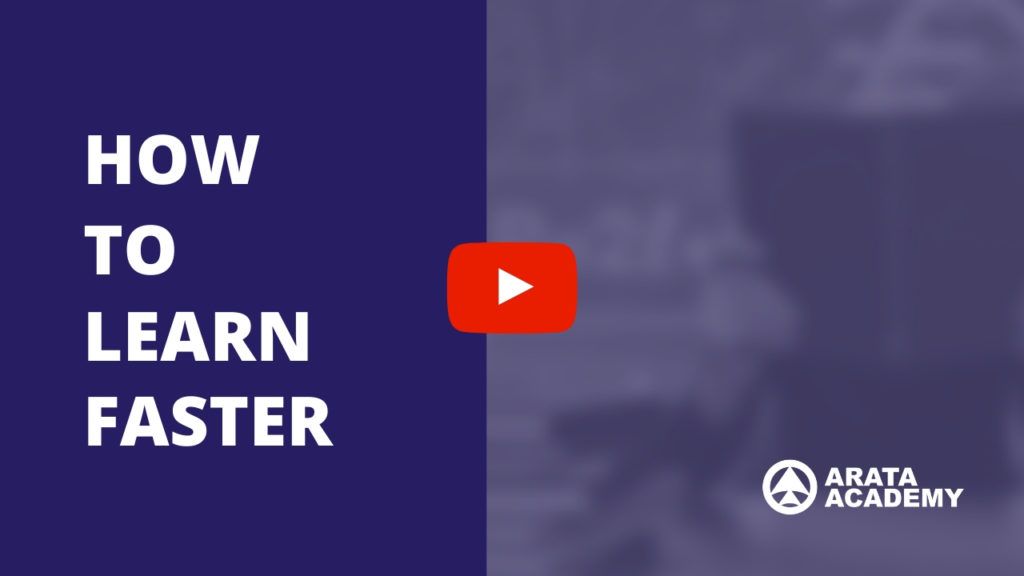Study Arata! Have you been following our weekly series of videos to help your learning? If so, you may have noticed that the latest videos are seeking to help you strengthen your confidence and self-esteem. You want to become a better student, right? Today, you will continue the process.
Let’s look at the main symptoms of difficulty in studies. Which of these symptoms do you identify with?
Anxiety
Anxiety arises when you constantly feel insecure and question your ability. You don’t feel comfortable with the challenges that you face in your studies.. You feel under pressure to learn. You have a lack of patience for reading materials. You don’t have enough discipline or motivation to perform the exercises.
Anxiety is the body’s reaction to a challenge. While anxiety is often perceived as bad, it can be good in some ways. It may even, in some cases, help your body to perform better.
Guilt and beating yourself up
Guilt is an emotional warning sign. The goal is to inform us that we have done or are doing something wrong. This leads us to reexamine our behaviour so that we don’t end up making the same mistake twice. This can be seen in those times in which you have a negative conversation with yourself. It’s almost a hypnotic conversation. You get thinking about how you were incompetent, stupid, sloppy, inattentive or lazy. Watch last week’s video here. It will teach you a very important lesson if you’re the kind of person that considers yourself to be dumb.
Guilt can be overwhelming. You feel as though you’re doing it all wrong. Guess what? This feeling makes you keep doing wrong things in the future. To avoid this feeling, you need to recognise that in reality, there is always a possibility of failure, but there’s also the possibility of success. It’s up to you to work in order to succeed. You can’t sit about waiting for success to knock on your door. Perfection doesn’t exist, we must put aside the negative thoughts and take the chance.
Have you ever wondered why some people achieve everything that they want to, while nothing goes right for others? Of course, behaviour and initiative are important factors, but what really sets these people apart from the others is their feeling of worth. People who feel guilty and don’t feel worthy unknowingly destroy everything in their lives.
Difficulty focusing
You depend on your focus to pass the subjects at school and many other issues in your day to day life. When you can’t focus, you can’t think clearly, concentrate on a task, or focus your attention on a particular subject. Your performance in school will be affected if you can’t concentrate.
One of the focus-related problems has to do with the amount of focus that you give to your tasks. That is, whether or not you do or don’t have the ability to spend enough time on your studies. The amount of focus that you have mirrors your ability to concentrate.
Trying to focus on more than one thing at once will only do more harm than good. For example, you won’t learn much if you’ve got one eye on your text messages and the other on the teacher at the front of the classroom.
Technology is always a two-way street – the user must have the insight to know how to use it to improve their life. Students can and should use the various softwares available to help them to learn and to organise their time. However, it’s important to know the right time and place to use these tools, so that they don’t unknowingly become slaves to this technology.
Social networks are also a major focus problem. Excessive use of social networks promotes a certain competition between real life and virtual life. Sometimes students are retained in social networks, forgetting the real life that is around them, and forgetting to study.
Another thing to think about is the quality of your focus. You want to devote your attention to the activities you can perform. You want to promote growth and improvement in your learning. Your focus won’t be of the best quality if you just sit around stewing on the mistakes you made in the past. When you keep questioning the fears that you have, how hard the test was, how you don’t like that particular subject, how the competition is tough…that’s when your quality of focus decreases. All you’re doing is wasting your time worrying about things that aren’t going to help you. To learn more about how you can solve these issues, click here.
Making excuses
You need a clear vision of reality. Take note of the points that you need to improve on. Stop rationalising and making up excuses.. By making up excuses, you end up moving away from reality, instead of admitting that you need help.
You say that the reason for not getting good grades in your studies or in your exam is because of that one day that you had a stomach ache. Because it was raining and you were afraid of being late. Or because you were worried and sat the exam when you were nervous. Or any other small lie that you invent for yourself. You’re hiding from the real truth: there are areas in your study technique that need to be improved.
Protecting your ego
This one is a true story. Many years ago, one of my friends proudly confessed, in front of everyone, that he had completed a test while he was drunk. Within our group of friends, it seemed as though he was bragging. As if he didn’t care that much about results, you know? He drank a lot and did the test anyway.
In this situation, if he had failed the test, he had an excellent excuse to protect his ego: the failure wasn’t because of lack of preparation, but, because he was living a fun life. Being under the influence of alcohol while doing the test.
But if he had achieved a good result in the test, it would be something even more amazing: even being drunk, he managed to pass. In either scenario, his ego was protected. As I said, this is a true story. Several years ago, I ended up using this silly and immature way of protecting my ego.
But there is something that still amazes me. Even in adulthood, within a group of people who I respect a lot, I see many adults behaving in similar ways. These are people who prefer to protect their ego, and because of that, they end up lying, saying that they’re not bothered about studying. But we know that in fact, they have a great fear of failure. To protect their own image, they pretend not to be interested in the studies and say that they prefer to sit idle and not follow their dreams.
Procrastination
Procrastination is the habit of postponing tasks or activities. How often have you postponed that piece of work? A lot of the time, we think we will only delay the task a day or two, but in the end we ended up putting off a week or two weeks.
This habit can have a negative impact on your school results. In fact, postponing tasks or studies usually causes anxiety, guilt and many unnecessary problems. You can overcome this habit by analysing the causes of procrastination and developing attitudes and behaviours that are essentially anti-procrastination. Try to identify your reasons for procrastinating. Is it stress, depression, underestimation of time? Identifying your reasons will make it easier for you to avoid procrastinating.
How can you decrease the difficulty in studies?
Every student comes across difficulties in their studies sooner or later. No matter where you are in the school day, if you feel that you’re not at the height of your studies, take a look at these tips which will help you with all the difficulties associated with your studies.
Get enough sleep. Not getting enough sleep undermines academic performance and makes it difficult to make the most of your day.
Think positive. Positive thinking can improve physical well-being, produce lower feelings of depression and produce lower levels of suffering.
Free yourself from worries. For this, you can use a social activity such as going out or participating in sports, finding a hobby or joining a social club.
Learn to relax. This can include things like slowly counting to ten, meditating, thinking positive thoughts, or playing with a stress ball.
Talk to someone. Sometimes, talking about what’s stressing you out or about the difficulties you feel, or just having someone to listen to your problems can dramatically reduce stress and anxiety. Talk to a family member, friend or even to your teachers.
Take a deep breath. Learn to breathe to release your anxiety. Whenever you’re about to start a new job, take a deep breath and say “I can do it”.
Praise yourself. Remember the times you managed to complete the tasks in the past and praise your work. Don’t just criticise what you did wrong. It’s important to learn how to value what you do well.
If you feel difficulty in your studies, the first thing to do is to increase the level of clarity you have about yourself. You need to understand what the sources of difficulty are. Only once you understand what’s holding you back can you make better choices to have different results.
Once you understand your symptoms of difficulty, you can implement changes and seek improvements. The improvement is achieved through better strategies, better choices, more dedication, more patience, better study materials, better teachers and with changes in the learning environment and study skills. You’ll find all of this and more in our t How to Learn Faster course

